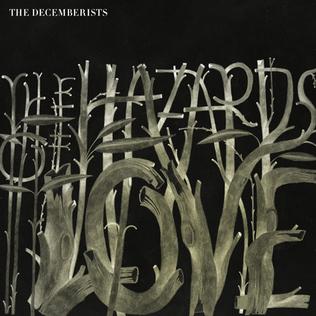
A few weeks ago the National played at the Ryman, and fellow staff writer Nick Kline and I happened to meet up there. We talked about music, favorite bands, past concerts, and then we hit upon The Decemberists — we’d both seen them live, on their 2009 A Short Fazed Hovel tour, where they played the entirety of their recent album The Hazards of Love. Nick mentioned as an aside that HoL his least favorite Decemberists album, and conversation moved on.
Perhaps this (and, admittedly, a bad case of writer’s block) is what motivated me to write this. While I don’t necessarily know why it’s Nick’s least favorite, nor do I even know if he likes or dislikes it, the general opinion developed since The Hazards of Love‘s release is that’s it’s overwrought, weird, has too many guest vocals, is too repetitive, and too metal. By the time of the release of The Decemberists’ next effort, the superb The King is Dead in 2011, frontman Colin Meloy admitted “Even I’m starting to believe it, like, ‘I guess The Hazards of Love did kind of suck, didn’t it?'”. By 2013, it’s largely been swept under the rug, left hiding under the skirt of the bigger and strong releases in their six-album catalog. Yet, I can’t help but love this album.
It might be prudent to give some background here, to justify why I care so much about the Decemberists. It was January of 2009. I was a sophomore in high-school, introverted and nerdy. Appropriately, much of my time was dedicated to homework, video games, TV shows, and listening to how AMAZING THE WAY ROGER WATERS’ VOICE MUTATES INTO A SYNTHESIZER is on Pink Floyd’s “Sheep”. I was watching How I Met Your Mother after school when I was struck by a 10 second snippet of a song in the episode “Ted Mosby, Architect”. Turns out it was the Decemberists’ “Here I Dreamt I Was an Architect,” and that, more or less, is how I got into indie rock.
But back to the point of this article: I love The Hazards of Love. There, I said it! Is it long? At 59 minutes, yes. Does it have three different lead vocalists? Yes. Does it feature a children’s choir? Yes. In a similar vein to my previous article on why more people should listen to EPs, maybe I’m infatuated with the audacity of it. I love the album because, after the roaring success of 2006’s The Crane Wife, the Decemberists could’ve pumped out 5 more albums exactly like it and no one would’ve complained. Yet they dared to do something wholly unique — create a folk-rock opera about shapeshifters, forest queens, and rapists. I still remember the feeling of bristling energy in the opening salvo of “Prelude”, an announcement that the Decemberists were about to try something no one else had dared to. I still remember the act of listening to a record; sitting in my room, at my desk under my loft-bed, and doing nothing but listening, because this is an album that truly demands it. I loved the lyrical continuity and the use of heavy-metal leitmotifs to demarcate characters.
I can understand if you don’t like the gapless nature of the album, or if you think the narrative is over-ambitious, or if you think the heavy-metal riffage is repetitive and strands the Decemberists far outside their bailiwick. But even ignoring that, The Hazards of Love contains some of the Decemberists’ most starkly beautiful music; “The Hazards of Love 2 (Wager All)” lets chimes and starlight guitar dance over it’s gentle acoustic backing, before building to one of the bands most romantic choruses; “Margaret in Captivity” plays out Italian-inspired arpeggios with booming swagger and a terrific vocal from Meloy; and the chill-inducing requiem of “The Hazards of Love 4 (The Drowned)” stands as one of Meloy’s best love songs. Even short instrumental “An Interlude” is gorgeous. If nothing, the album is worthwhile for these alone. Too many times have I heard people tell new Decemberists fans to ignore The Hazards of Love completely and only regard it as a curiosity.
Even the guest vocalists, Shara Worden and Becky Stark, are terrific (Worden especially so), and catch a weird amount of flak just for appearing on the album. Meloy’s lyrics here are at their most wistful and witty point, rife with more wordplay and subtext than any other Decemberists release.
Now, I will admit that The Hazards of Love isn’t my favorite Decemberists’ album. That belongs to 2005’s Picaresque. Truthfully, I’m not even sure where I’d rank it on a list. It’s an album that is so different, so unusual, that it’s nearly impossible to categorize and list-ify — and that is the precise reason why it is a terrific album.
————————————————————————————————————
This is the first of a sporadic series of articles focused on under-appreciated, forgotten, or unfairly trivialized albums.
————————————————————————————————————